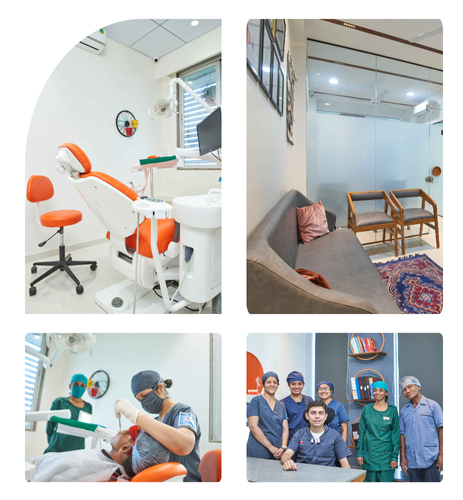Affordable Dentures in Adajan, Surat
Custom-made comfort that brings back your bite and facial fullness.

Missing teeth affect more than just your smile — they can change how you eat, speak, and feel about yourself. At NxtDent Dental Clinic in Adajan, Surat, we understand the physical and emotional challenges of tooth loss — it’s a hidden disability, but one that’s completely treatable. That’s why we’re here to help you restore comfort, confidence, and quality of life.
Whether you’re missing a few teeth or need a full-mouth replacement, we offer customized denture solutions—from traditional removable dentures to implant-supported options—designed to look natural, fit comfortably, and function like real teeth.
With modern techniques, premium materials, and a caring team led by experienced professionals, getting dentures is now more comfortable, discreet, and life-changing than ever.
Schedule your consultation today and let us help you smile, speak, and live confidently again.
Conventional Removable Dentures
Removable dentures are an economical way to restore your smile.
Types of Removable Dentures
- Conventional Removable Complete Dentures: An affordable option for replacing all missing teeth, placed 8–12 weeks after extractions once healing is complete. Cost: ₹25,000 – ₹50,000
- Immediate Complete Dentures: Prepared in advance and placed right after tooth removal, so you're never without teeth. May need frequent adjustments during healing.
- Partial Dentures:Ideal when some natural teeth remain. Restore function and aesthetics. Acrylic partials cost ₹15,000–₹45,000, while metal ones range from ₹25,000–₹50,000+.
Limitations: Conventional dentures may slip, cause discomfort or self-consciousness, and don’t prevent jawbone loss over time.
Implant-Supported Dentures
A secure, natural-looking alternative to traditional dentures, implant-supported dentures are anchored to 2–6 implants for added comfort and stability. Depending on your needs and budget, choose between removable overdentures or fixed full-arch restorations like All-on-4/All-on-X.
Benefits:
Stable & secure – no slipping
Prevents bone loss
Improved chewing & speech
More natural, long-lasting feel
Which Option is Right for You?
Both options offer life-changing benefits, including improved chewing, speech, and appearance. At NxtDent, we guide you through every step—from planning to aftercare—ensuring the solution fits your needs, lifestyle, and budget. Whether you choose removable or fixed, you’ll walk away with renewed comfort, confidence, and a smile that lasts. Usually our assessment involves -
Summary: Implant-supported dentures are the gold standard—stable, bone-preserving, and natural-feeling. The choice between removable and fixed depends on your goals and budget.
| Type | Removable (Overdentures) | Fixed (All-on-X) |
|---|---|---|
| Attachment | Snap onto implants (ball/locator/bar) | Permanently fixed on implants |
| Cleaning | Removed daily for cleaning | Brushed like natural teeth |
| Comfort | Very stable, but still removable | Feels like real teeth |
| Maintenance | Easy to maintain | Needs professional check-ups |
| Cost | Lower ₹1,20,000 to ₹3,50,000 per arch |
Higher with better advantages ₹3,00,000 to ₹6,00,000 per arch |





